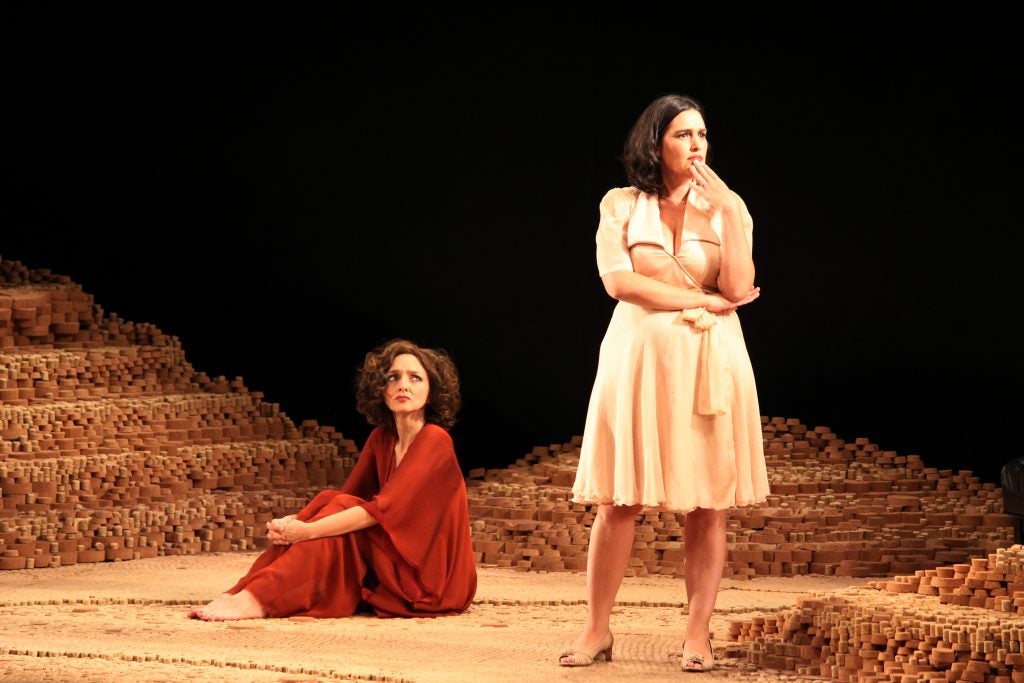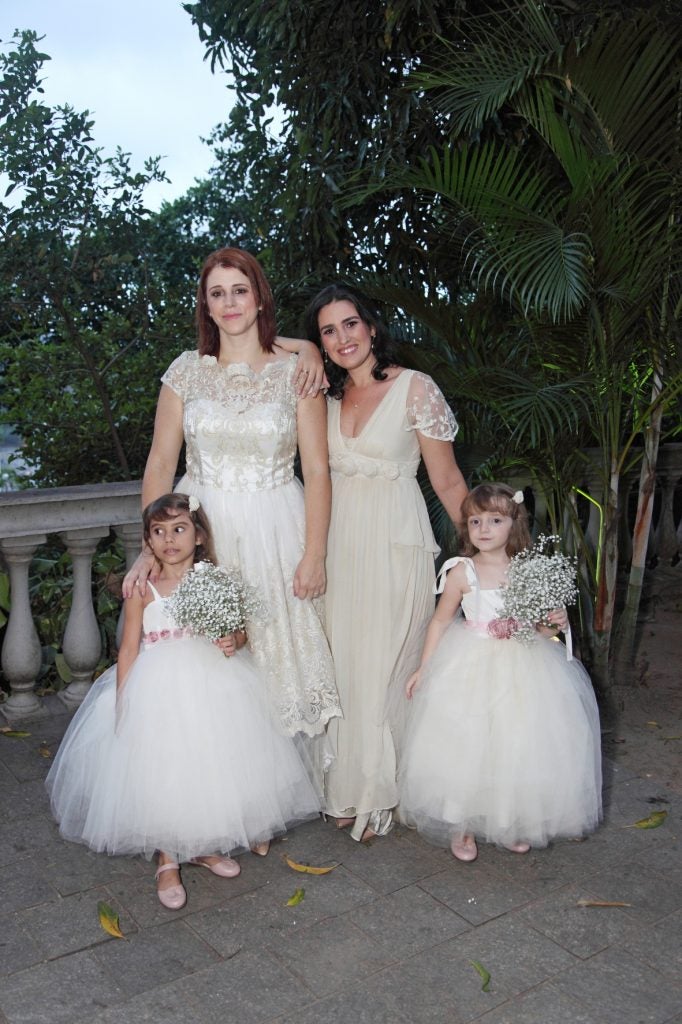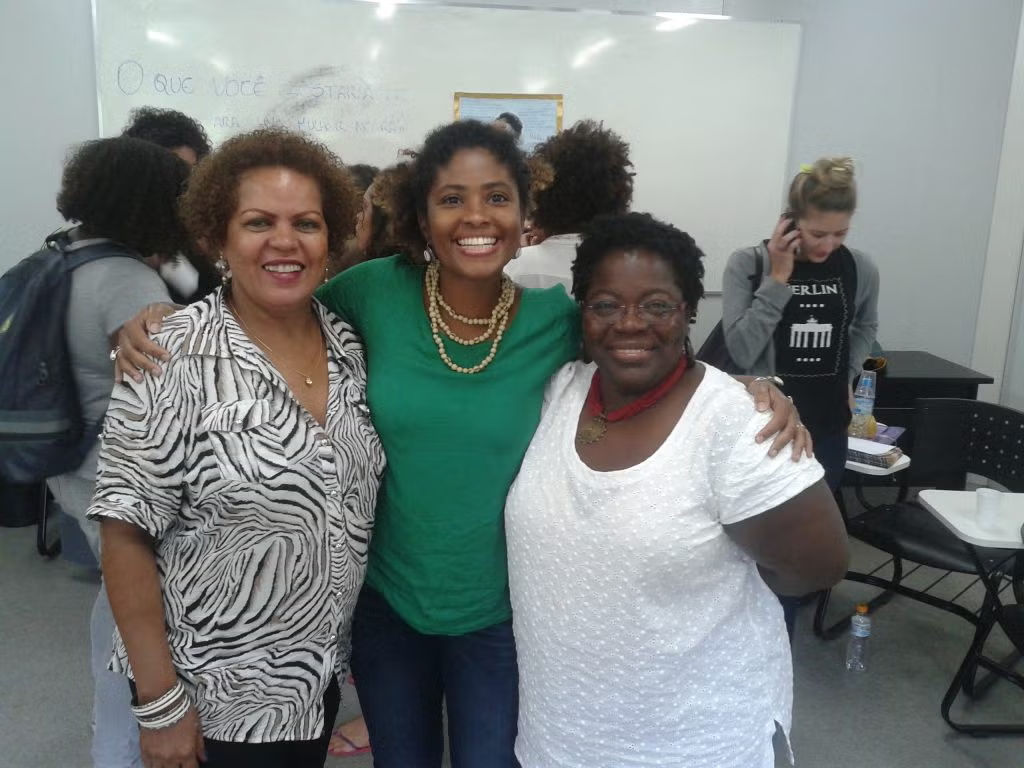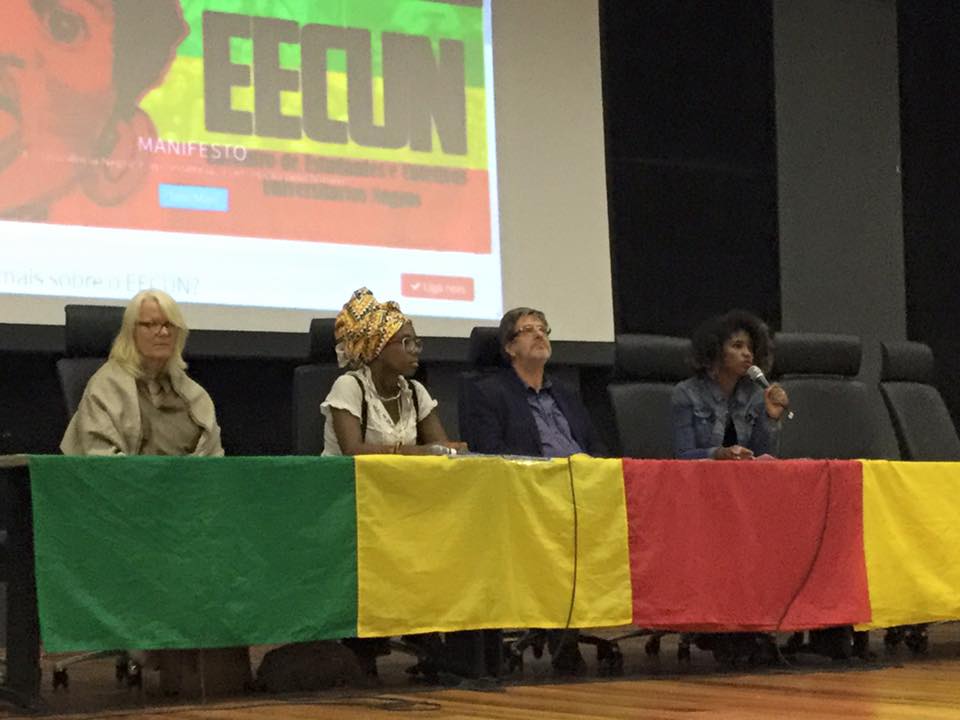Citations may be to the website as a whole, to a particular page (such as the lesson plan for teaching about intersectionality), or to a particular interview transcript (such as this transcript).
Introduction to the Brazil Site
of the Global Feminisms Project
Sueann Caulfield and Marisol Fila
These interviews, conducted in 2014, 2015, and 2018 reflect the variety of women’s activism and scholarship in Brazil in the late twentieth and early twenty-first centuries. They include discussions on the rise and fall of dictatorships, the history of slavery and racial inequalities today, land rights, and emerging network of NGOs addressing social issues. Notably, interviewees focus on issues of domestic violence, working class dynamics, LGBTQ rights, and art as social change.
In June 2022 Sueann Caulfield, Claudielle Pavão, and Renata Saavedra worked alongside GFP interviewees Laura Castro and Marilda de Souza Francisco to organize the “Global Feminisms Seminar” in Brazil. The conference focused on the uses of the archive in teaching as well as reflections on oral history and feminist activism.
Resources
This timeline has been prepared by Greta Kruse for the Global Feminisms Project during the 2019-2020 academic year.
Overview of the Brazil Site and Interviews
The choice of interviewees for the Brazil section were chosen in three stages. The first stage was an undergraduate course on Brazilian social movements, taught jointly by history professors Keila Grinberg, Universidade Federal do Estado do Rio de Janeiro and Sueann Caulfield, University of Michigan, in Winter 2014. The course led to the second stage, a collaborative project involving Professors Ana Maria Mauad, Martha Abreu, and Hebe Castro of the Universidade Federal Fluminense and Laboratorio de História Oral e da Imagem, with support of the Brazilian National Council for Scientific and Technological Development, in 2014-2015. Most of the interviewees were selected through conversations among these collaborators and reflect their interest in the history of Brazilian feminism, the relationship between grass-roots activists and larger non-governmental organizations, the intersection of race, class, and gender, and the prominence of women in the movement for recognition of Quilombola (Afro-Brazilian heritage) communities. Renata Saavedra, then a UNIRIO undergraduate and Global Feminisms Project intern, also interviewed Giordana Moreira and Nataraj Trinta as part of research that would eventually become the basis of her Ph.D. dissertation (Universidade Federal do Rio de Janeiro, 2018) on urban art and feminism in Rio de Janeiro. The other interviews completed during this period are Luciana Adriano da Silva and Angélica Souza Pinheiro, Iara Amora dos Santos, Laura Castro, Maria de Fátima Lima Santos, Marilda de Souza Francisco, Maria Teles, Elizabeth Viana and Giovana Xavier, and Shirley Villela. The third phase was initiated in 2018, when University of Michigan Ph.D. candidate Marisol Fila joined the project, adding interviews that were connected to her research on contemporary Black feminisms and digital media. In the past decade, young black intersectional feminists have become more visible in social media, and brought awareness to contemporary experiences of black young and urban women in Brazil. Diane Lima and Haynará Negreiros, curators and interdisciplinary artists and cultural producers, were identified as two referents of this twenty- first century movement in São Paulo and interviewed in the summer of 2018.
Political movements for women’s rights first became significant in Brazil in the early twentieth century, when groups led primarily by middle-and upper-class, educated women advocated for the expansion of women’s political rights, the right to education, equal labor rights and protections, and equality within the family. Members of this early generation of Brazilian women’s rights leaders were also active in international and Pan-American feminist organizations. After achieving significant gains in the 1930s, including women’s suffrage, organized women’s rights groups declined during the Vargas dictatorship(1937-1945) and they did not regain their former organizational strength until the late 1970s, when another military dictatorship (1964-1985) began a process of gradual political opening in preparation for a return to civilian rule.Feminism emerged as a significant political philosophy within leftist political organizations and the “new social movements” that mushroomed in the late 1970s. Women from across social classes tended to be prominent in these grass-roots movements, which formed outside of traditional partisan politics to struggle against various forms of social inequality and in justice as well as political repression. Increasingly, many of these movements placed themselves under the umbrella of human rights and conceived of themselves as non-governmental organizations. In addition to the spread of feminism within these organizations, a number of autonomous, self-identified feminist groups emerged during this period. Over the last few decades of the twentieth century, many of them made connections with and received funding from international NGOs and foundations. During this period and into the twenty-first century, feminism was increasingly incorporated into movements that focused particularly on discrimination based on race, class, and sexual orientation or gender identification.
Read More...In her interview, Maria Amelia (“Amelinha”) Teles , a former Communist Party militant and founder of the feminist group União de Mulheres do Municipio de São Paulo in 1981, offers her personal story as a window on the emergence of feminism within leftist political parties during the transition to democracy in the 1970s and 1980s.She speaks of the development of her feminist consciousness alongside her perception of class oppression, starting with her experience as the child of working-class communist party militants of Italian descent and developing as she joined the male-dominated communist party. Her theoretical understanding and commitment to feminism was cemented when, as a political prisoner and ex-convict, she found support among largely middle-class, university educated feminist women.
From the transition to democracy through the end of the century, as Teles and other feminists joined struggles for amnesty for political prisoners, justice for victims of the military’s human rights violations, and equal political and civil rights for women, they also addressed endemic everyday forms of gender violence. In addition to innovative local responses, Brazilian feminists participated in international women’s rights efforts, including the Inter-American Convention on the Prevention, Punishment, and Eradication of Violence Against Women, adopted in 1994 in the Brazilian city Belém do Pará. The resulting treaty, ratified by Brazil in 1995, solidified the movement in international law to hold states responsible for violations by private perpetrators if the states fail to effectively prevent or prosecute them.
Teles’s group in São Paulo was among the first to focus attention on domestic violence, helping to identify it as a major violation of Brazilian women’s human rights. More recently, Maria da Penha Maia Fernandes has become the face of the national campaign. In 2002, the Inter-American Commission for Human Rights found Brazil to have violated her rights under the Belém do Pará and other conventions for its failure to properly investigate the attacks she suffered at the hands of her former husband, which left her partially paralyzed, and for its broader failure to prevent domestic violence. The case resulted in highly publicized mobilizations of feminist NGOs and state agencies and the creation of a new law in 2006. Named after Maria da Penha, the law aims to assist victims and end impunity for perpetrators. In her interview, Maria da Penha discusses the intersection of her personal life history and her ongoing work through the Maria da Penha Foundation to ensure enforcement of the law and to educate legal professionals and the public about domestic violence and the needs of people with disabilities.
Shirely Villela and Iara Amora dos Santos represent the ways feminists have maneuvered within what some scholars have referred to as the “ngo-ification” of social movements since the 1980s. Both women are employed by NGOs that receive funding from national and international organizations to empower working class women through legal or professional support and education. Villela discusses her own coming of age as a feminist through her work in the 1980s and 1990s in IBASE, a social rights NGO that brought together prominent activists, including “historical” feminists (those who formed feminist groups in the 1960s and 1970s) who worked through the UN and other international organizations. Villela currently runs a project that offers professionalization in culinary arts to women in Maré, an impoverished group of neighborhoods in Rio de Janeiro. The project is supported by the NGO “Networksof Maré,” which itself is supported by various national and international organizations.
Iara Santos is co-founder of a young women’s group at the House of the Working Woman (CAMTRA) in downtown Rio de Janeiro, an NGO created in 1997 by her mother, Eleutéria Amora, who, like Amelinha Teles, developed a feminist perspective while she was a militant in a leftist political party that opposed the military dictatorship in the 1970s. Santos discusses her organization’s combination of popular education campaigns regarding AIDS prevention, reproductive health, contraception, and domestic violence; direct assistance to women who need legal, emotional, or logistical support, for example, for victims who want to file a police complaint or secure protection; and lobbying for changes in laws regarding reproductive rights and other issues.
Although many long-time feminists such as Amelinha Teles have been sensitive to the ways racism intersects with class and gender discrimination, many black feminists found that feminist organizations of the 1970s-2000s were composed largely of middle-class white women who failed to consistently address the specific impact of racism on women of African descent. Elizabeth Viana and Giovanna Xavier discuss gender oppression from the perspectives of two generations of black women activists. Viana speaks of her work as a militant in Black neighborhood organizations and in the anti-racist mobilization that was part of the wave of social movements that emerged during the transition to democracy in the late 1970sand 1980s. Over the next few decades, her militancy developed both through her participation in community groups and in her work as a civil servant who helped expand citizens’ access to Rio de Janeiro’s municipal council. Her trajectory was inspirational to Xavier, who met her when both women took a university course that focused on Afro-Brazilian history and was taught by a black professor –which, they remarked, was a rarity. Xavier speaks of her own experience growing upas the daughter of a school teacher, often being the only black child in her private school classroom, and feeling obliged to “always get the best grades,” “always speak low,” and deal with “the hair thing.” In college, she joined leftist student movements, but felt alienated when her very presence was sometimes cited as evidence that racial exclusion was not among Brazil’s most important political problems. Today a university professor, Xavier participates in loosely organized black women’s groups and has focused her scholarly work on black women’s history.
One of the achievements of the Black Movement in Brazil in the 1980s was to ensure that the 1988 Constitution guaranteed collective property rights to communities that had descended from the many land occupations by maroons during Brazil’s long history of slavery (1500-1888). Marilda de Souza Francisco, Angélica Souza Pinheiro, and Luciana Adriano da Silva participated in the struggle to gain recognition of their poor, rural community’s claim to such rights, and then to develop viable and meaningful cultural and economic initiatives that will allow the community to survive. Marilda, a long-time community leader, speaks of the deep history of the struggle and opportunities it created for young people such as Marilda and Angélica, who recently graduated from college. The three women, who had not previously considered whether their work was “feminist,” all talked about the ways their work as women leaders itself challenged sexist gender norms.
Sexual orientation and gender expression, which once divided feminists, have become vibrant areas of feminist activism in the early twenty-first century. The increasing visibility and achievements of transgender and LGBT activists are discussed in the context of feminism by anthropologist Maria de Fatima Lima Santos and writer/actor/director Laura Castro. Santos describes how her own rebellion against conservative gender and sexual norms of the Northeastern state where she was raised led her to pursue a career that blends feminist, LGBT, and transgender activism with her work as a scholar and educator. In addition to her work around inclusion and equal access to health care, she speaks enthusiastically about a new generation of student activists she has encountered in her classrooms who have mobilized around transgender and sexual rights. Laura Castro was raised in a more progressive environment in the city of Rio de Janeiro and feminism came naturally to her; she mentions her mother, a well-known history professor, as inspirational in this regard. Yet she also sees the process of coming out as a lesbian to her family as part of her political awakening. When Castro and her life partner (now wife –same sex marriage was legalized in 2010) were ready to start a family, their search for information on same-sex family rights led her to become involved in, and later president of, a same-sex parents’ organization. Her life experiences as a daughter, mother, and now wife have informed her creative work in a variety of ways, and she sees this work as another form of LGBT and feminist activism. Like the other feminists interviewed for this archive, Castro thus describes a seamless relationship among her personal life, her professional life, and her feminism.
In 2018 Marisol Fila, doctoral student at the University of Michigan, conducted 7 interviews with Black feminist artists, intellectuals and activists in São Paulo, Brazil as part of her own research. She generously shared these with the Global Feminisms Project. Two in-person interviews were translated into English and the usual contextual information is provided as well: Diana Lima and Haynará Negreiros. Five were recorded online, and are offered as untranslated interviews.
All of these 2018 interviewees are with Afro-Brazilian women activists, intellectuals, and artists who are building on the tradition of GELEDÉS, São Paulo’s Institute of Black Woman, founded in April 1988. GELEDÉS stresses the importance of understanding the particular experiences of black women, as subjects suffering not only from gender, but also racial and class discrimination. The institute, through its founder Sueli Carneiro (a recognized Afro-Brazilian philosopher, writer, anti-racist and feminist activist) has had a crucial role in developing social, cultural and political programs in connection with other grassroots organizations, as well as a strong online presence via its news portal. Young black intersectional feminists in Brazil have built on the tradition of GELEDÉS and Sueli Carneiro’s thought, and claimed a greater visibility of their particular experiences through social media. These women are interdisciplinary artists and intellectuals, who many times combine an intellectual and artistic work with an activist praxis that aims to discuss black intersectional feminisms with a broader audience, in a language that avoids jargon and is connected to everyday experiences of young black and urban women from Brazil.
The seven interviewees were chosen to provide exposure to the range of interdisciplinary work from a black intersectional feminist thought. There are two videotaped in-person interviews. One is with Diane Lima, who is a cultural producer and curator, trained in Communication and currently experimenting with artistic and curatorial multidisciplinary practices from a perspective that is collaborative and emphasizes horizontal production of knowledge. Finally, Haynará Negreiros, also a cultural curator, focuses on Afro-Brazilian fashion and aesthetics through Candomblé’s women clothes.
The five “virtual” interviewees include Luciane Ramos Silva, who is a dancer, anthropologist, choreographer and co-editor of the print and digital magazine O Menelick 2Ato. Stephanie Ribeiro was trained in architecture and urbanism, and writes for local and international magazines and journals, such as Marie Claire and The Huffington Post. Aryani Marciano is an interdisciplinary artist who combines poetry, music and performance in work that aims to make visible the experiences of young black women from the peripheries. Joice Berth, trained in architecture and urbanism, specializes in studying the spatial inequalities in São Paulo in connection with race, class and gender. Joice has also published a book on black feminist empowerment in 2018. Fabiana Carneiro da Silva is a literary scholar who researches black autobiographical women’s writing, and is also a creative writer in an online publication.
Claudielle Paivão’s interview of Lourdes Barreto, conducted in 2022, offers an insider’s perspective on the history of sex workers’ activism. In the 1980s, Barreto became a leader of one of the first sex workers’ organizations in Brazil and helped to form a national network of sex worker activists. Her discussion of her own experiences as a sex worker and her trajectory as an activist illuminate key moments in Brazil’s recent history, shifting attitudes regarding sexual morals, and sex workers’ demand for recognition, respect and citizenship rights.
Procedures for Producing Final Interview Videos and Transcripts
Nine of the interviews were conducted by Sueann Caulfield, with help from Keila Grinberg, Marília Ariza, and Martha Abreu. Of the remaining four, two were conducted by Renata Saavedra (Nataraj Tringa and Giordana Moreira). These interviews were recorded live, transcribed in full and are presented unedited, consistent with the interviewees’ agreement. Finally, Marisol Fila completed seven interviews. Two of these, with the interviewees Diane Lima and Haynará Negreiros, were recorded live, transcribed in full and are presented unedited, consistent with the interviewees’ agreement. She also completed 5 more interviews virtually, which remain in Portuguese.
In 2022, Claudielle Paivão, PhD candidate at the Federal Rural University of Rio de Janeiro, conducted an interview with Lourdes Barreto, a pioneering activist for the sex workers’ rights. The interview was conducted via Zoom video conference.
The Brazil country site interviews were completed with a generous project grants from the Brazilian National Council for Scientific and Technological Development (CNPq) and the University of Michigan Humanities Collaboratory.








